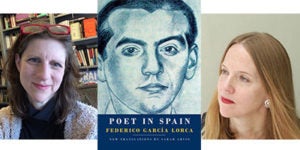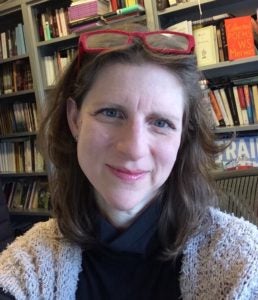Behind the New Translations of Federico García Lorca’s Poetry with Knopf’s Deb Garrison and Sarah Arvio
November 10, 2017
 For the first time in a quarter century, a major new volume of translations of the beloved poetry by Federico García Lorca, considered Spain’s most famous poet and dramatist of all time, was published by Alfred A. Knopf. POET IN SPAIN, presented in a stunning bilingual edition and heralded as a literary landmark, was edited by Deb Garrison, Senior Editor, Alfred A. Knopf. Here she shares fascinating personal insights into how this collection was created and the editorial process involved while working closely with Knopf poet, author and translator Sarah Arvio.
For the first time in a quarter century, a major new volume of translations of the beloved poetry by Federico García Lorca, considered Spain’s most famous poet and dramatist of all time, was published by Alfred A. Knopf. POET IN SPAIN, presented in a stunning bilingual edition and heralded as a literary landmark, was edited by Deb Garrison, Senior Editor, Alfred A. Knopf. Here she shares fascinating personal insights into how this collection was created and the editorial process involved while working closely with Knopf poet, author and translator Sarah Arvio. 
 Deb Garrison[/caption]
“As Arvio reminds us in her introduction to POET IN SPAIN, Lorca was celebrated in his lifetime as a playwright and poet of the Spanish people; he wrote about their inner lives amidst the ‘poplars, rivers, low hills and high sierra’ of his native land, with a freedom and daring that has caused his work to remain beloved and canonical in Spain, though it was banned there throughout Franco’s reign, into the 1970s. Lorca’s haunted and beautiful Dark Love Sonnets, which he was writing to a homosexual lover at the time of his death, and seem almost to anticipate that tragedy, survived only in a handwritten copy. These amazing poems waited nearly half a century to come to light, remaining unpublished until the 1980s. In our time, Sarah had the whole of the poet’s oeuvre to consider, and had definite feelings about what to include in her selection. Many of us are aware of Lorca’s surrealist-influenced work, Poet in New York, which grew out of his time spent in the United States in 1929. Sarah believed that the Spanish poems—poems of love and death, of lemon groves and bandits on black horses, which have what she calls a “wild, innate, local surrealism”—form the genuine core of the poet’s work. She discussed this with Laura García Lorca, the poet’s niece and Sarah’s contact at the estate, and Laura suggested she call her book “Poet in Spain”— setting up a contrast between the earthy Spanish poems and the more mannered, abstract New York work.
[caption id="attachment_8677" align="alignleft" width="300"]
Deb Garrison[/caption]
“As Arvio reminds us in her introduction to POET IN SPAIN, Lorca was celebrated in his lifetime as a playwright and poet of the Spanish people; he wrote about their inner lives amidst the ‘poplars, rivers, low hills and high sierra’ of his native land, with a freedom and daring that has caused his work to remain beloved and canonical in Spain, though it was banned there throughout Franco’s reign, into the 1970s. Lorca’s haunted and beautiful Dark Love Sonnets, which he was writing to a homosexual lover at the time of his death, and seem almost to anticipate that tragedy, survived only in a handwritten copy. These amazing poems waited nearly half a century to come to light, remaining unpublished until the 1980s. In our time, Sarah had the whole of the poet’s oeuvre to consider, and had definite feelings about what to include in her selection. Many of us are aware of Lorca’s surrealist-influenced work, Poet in New York, which grew out of his time spent in the United States in 1929. Sarah believed that the Spanish poems—poems of love and death, of lemon groves and bandits on black horses, which have what she calls a “wild, innate, local surrealism”—form the genuine core of the poet’s work. She discussed this with Laura García Lorca, the poet’s niece and Sarah’s contact at the estate, and Laura suggested she call her book “Poet in Spain”— setting up a contrast between the earthy Spanish poems and the more mannered, abstract New York work.
[caption id="attachment_8677" align="alignleft" width="300"] Sarah Arivo
Sarah Arivo(c) Rigel Garcia de la Cabada[/caption] “As Sarah observes, poems like the iconic Gypsy Ballads were ‘full of radical iconoclasm: homosexual, feminist, anti-State, anti-religion. The descriptions of human desire, oppression and suffering are cloaked in a language so lovely you hardly notice the social criticism, the compassion for oppressed people, the belief in sexual liberty.’ In our age of gender fluidity, I was especially moved by Sarah’s freedom to enter the male love poems—bringing a feminine understanding into the work without missing a heartbeat. Sarah has composed the poems in English with her own style and sound, according to her personal sense of the powerful underground currents and bold wishes at the center of even the shortest songs Lorca penned. Also very exciting to me was that Sarah had found a few poems never formally published and never before seen in English, among them a love poem written on the back of a bill and saved for decades by a younger lover of Lorca’s, and the fragment of an unfinished sonnet that was probably connected to the Dark Love series. There is too much from this beautiful volume that I could quote—truly an embarrassment of riches, including a new translation of the play Blood Wedding, which Sarah calls a tragic poem in its own right—but I’ll share the Dark Love fragment. These eight lines of an incomplete sonnet, written on the thin, grayish paper he used for rough drafts, poignantly express the imaginative process and living energy of the poet, which Sarah Arvio has tried to breathe into every line of her book: [Oh hotel bed oh this sweet bed] Oh hotel bed oh this sweet bed Oh sheet of whitenesses and dew Hum of your body with my body Cave of cotton flame and shadow Oh double lyre that my love branches around your thighs of fire and cold white nard Oh tipping raft—oh bright river— now a branch and now a nightingale
Popular Company News
PW’s Spring 2026 Writers to Watch Featuring PRH Authors
January 23, 2026
Publishers Weekly recently named several Penguin Random House authors to its Spring 2026 Writers to Watch list, recognizing a standout group of voices whose debuts are…
In Memoriam: Ann Godoff, Founder, President, and Editor-in-Chief, Penguin Press
February 26, 2026
From Scott Moyers, President & Publisher, Penguin Press: It is with great sadness that I write with the news of the passing of our beloved colleague…
Streaming Now on Netflix: PEOPLE WE MEET ON VACATION, Emily Henry’s #1 Bestseller
January 16, 2026
Netflix’s film adaptation of the #1 New York Times bestseller PEOPLE WE MEET ON VACATION by Emily Henry (published by Berkley in 2021, with subsequent editions,…
Spotlighting Our 2026 ALA Adult Award Winners and Honorees
January 29, 2026
This week, the American Library Association kicked off the 2026 literary awards season with the announcement of their adult book awards, including the Andrew Carnegie Medals,…
NYT’s Most Anticipated Movie Adaptations: PEOPLE WE MEET ON VACATION and More!
January 9, 2026
Still deciding what to add to your TBR this year? The New York Times just rounded up a list of books to read before they hit…
Vonnegut Estate, Authors, and Student Plaintiffs Take Utah to Court Over the Freedom to Read
January 7, 2026
On Tuesday, January 6, the American Civil Liberties Union of Utah Foundation, Inc. (ACLU of Utah) filed the first major case defending the freedom to read…
RHCB Authors and Illustrators Receive Accolades from the ALA Youth Media Awards!
January 27, 2026
The American Library Association (ALA) announced the 2026 Youth Media Awards on Monday, January 26 at the Hilton Chicago Hotel, and several Random House Children’s Books…
2026 Book Cover Designers to Watch Featuring Two PRH Designers
January 16, 2026
We love seeing book cover design get its moment, especially when it comes to our designers! In a recent OurCulture article highlighting seven designers worth following…
WaterBrook Marks 30th Anniversary in 2026 with Yearlong Celebration
January 8, 2026
WaterBrook, the flagship imprint of Penguin Random House Christian Publishing Group, is celebrating its 30th anniversary in 2026 with a yearlong campaign highlighting the imprint’s history,…
